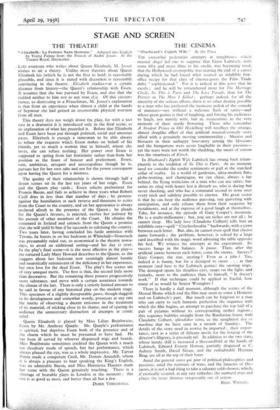STAGE AND SCREEN
THE THEATRE
"Elizabeth: La Femme Sans Homme." Adapted into English by Yvette Pienne from the French of Andre Josset. At the Theatre Royal, Haymarket
LIKE everyone who writes about Queen Elizabeth, M. Josset wishes to air a theory. Unlike most theories about Queen Elizabeth his (which he is not the first to hold) is reasonably plausible, and since it is stated with discretion is reasonably convincing in the theatre. Elizabeth studies—at a certain distance from history—the Queen's relationship with Essex. It assumes that she was pursued by Essex, and also that she yielded neither to him nor to any man else. Of this circum- stance, so distressing to a Frenchman, M. Josset's explanation is that from an experience when almost a child at the hands of Seymour she had gained an irremovable physical aversion from all men.
This theory does not weigh down the play, for with a tact rare in a dramatist it is introduced only in the final scene, as an explanation of what has preceded it. Before that Elizabeth and Essex have been put through political, social and amorous paces. Elizabeth is enough a statesman to be able always to refuse the requests which Essex makes on behalf of his friends, yet so much a woman that to himself, whom she loves, she can refuse nothing. Her power over Essex is supposed to spring from her femininity rather than from her position as the fount of honour and preferment. Essex, vain, ambitious, arrogant and unscrupulous though he is, pursues her for her own sake and not for the power consequent upon having the Queen for a mistress.
The quality of their relationship is shown through half a dozen scenes set in the last ten years of her reign. Essex and the Queen play cards.; Essex solicits preferment for Francis Bacon, and fails to achieve in three years what Robert Cecil does in less than that number of days ; he protests against the humiliation at each reverse and threatens to retire from the Court to the country, and on her appearance is always enslaved afresh to the presence of the Queen ; he pleads for the Queen's favours, is rejected, excites her jealousy by his pursuit of other members of the Court. He obtains the command in Ireland and extracts from the Queen a promise that she will yieldro him if he succeeds in subduing the country. Two years later, having concluded his futile armistice with Tyrone, he bursts in on her bedroom in Whitehall—Nonesuch was presumably ruled out, so economical is the theatre nowa- days, to Avoid an additional setting—and his day is over. In the play's final scene—it is the most effective in the play— the tortured Lady Mary Howard describes to the Queen, as she staggers about her bedroom now seemingly almost lunatic and neurotically reminiscent of the deficiency in her experience, her own love for the dead Essex. The play's five scenes are of very unequal merit. The first is thin, the second little more than decorative. But the remaining three possess progressively more substance, and move with a certain assurance towards the climax of the last. There is only a strictly limited amount to be said in favour of any historical play on the modem stage. This specimen of a slightly disreputable genre, though sluggish in its development and somewhat wordy, possesses at any rate the merits of observing a decent reticence in the treatment of its material, of sticking close to its theme, and of sparing its audience the unnecessary distraction Of attempts at comic relief.
Queen Elizabeth is played by Miss Lilian Braithwaite, Essex by Mr. Anthony Quayle. Mr. Quayle's performance is spirited, but deprives Essex both of the presence and of the charm which he must be presumed to have had. He has been ill served by whoever dispensed wigs and beards. Miss Braithwaite sometimes credited the Queen with a much too desultory mode of speech, but her performance, which always pleased the eye, was as a whole impressive. Mr. Tarver Penna made a competent Cecil, Mr. Dennis Arundell, whom it is always a pleasure to hear speaking the King's English, was an admirable Bacon, and Miss Hermione Harmen made her scene with the Queen genuinely touching. There is a shortage of bearable plays in London at the moment; this one is as good as most, and better than all but a few.
DEREK VERSCHOYLE.


























































 Previous page
Previous page